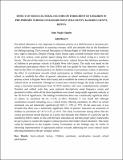| dc.description.abstract | Pre-school education is very important in education process of a child because it increases pre-school children's opportunities to acquiring concepts, skills and attitudes that lay the foundation for lifelong learning. The Universal Declaration of Human Rights of 1948 declares that everyone has a right to education. Despite it being a basic human right, available literature shows that still in the 21st century, some parents ignore taking their children to school owing to a variety of factors. The aim of this study is to investigate the socio- cultural factors that influence enrolment of children in pre-primary schools in Kajiado West Sub-County. The study was based on the educational participation theory by Finn (1993) and was guided by four objectives namely: to find out the effect of cultural practices on children enrolment in pre-primary school, to determine the effect of socialization towards school participation on children enrolment in pre-primary school, to establish the effect of parents’ education on school enrolment of children in pre-primary school in Kajiado West Sub-County and to establish the extent of minimizing the social cultural factor on enrolment. Through an ex-post facto research design, the study collected data using a structured questionnaire from 53 ECD teachers who were comprehensively sampled. Nominal and ordinal scale data were analyzed descriptively using frequency counts and presented in tables while all the three hypotheses were tested using simple regression analysis at the .05 level of significance. The findings revealed that there was a statistically significant effect of culture on enrolment (β=.34; t=3.36; p=.001). Similarly it was found that although socialization towards schooling was a critical factor effecting enrolment, its effect on school enrolment was not statistically significant (β=.045; t= .259; p=.797). On the same note, it was revealed that there was a statistically significant effect of parents’ education on enrolment of children in preschools (β=.477;t=2.52; p=.015). The study recommends among others that the county government should legislate on a policy that demands that children of a particular age be enrolled in EDCE centres in line with the basic education act and that proper policy frameworks be put in place to counter the negative cultural practices that hinder school enrolment. This study could be beneficial to the Kajiado County Government as the findings may be useful in informing implementation of appropriate policies towards addressing the social cultural issues affecting enrolment in the pre- primary school. | en_US |

